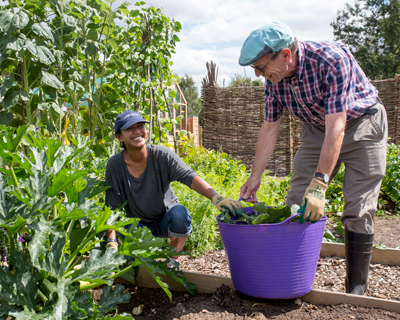Gardening after a stroke
Find out how gardening can be an important part of a stroke survivor’s recovery process
For landscape designer and stroke survivor Miria Harris, suffering a stroke was a “disconnecting and disembodying experience.”
“A stroke can strike anyone at any time. The after effects of a stroke affect people in different ways; the only communal experience is the trauma.”
Discover eight ways gardening can support you on your recovery journey.
1) Helps you to adapt
Prior to his stroke, Jonathan worked as a journalist. He now works for the Stroke Association as a Stroke Information Officer and often speaks to survivors as part of his role. He tells them: “I’ve been where you are and it is a long hard struggle, but you can do it.”
Jonathan also finds breaking jobs down into smaller tasks makes them more manageable. “I keep a small container close by so when I’m pulling out weeds, I have somewhere to put them. Once I’ve finished, I’ll carry the container to the
2) Promotes independence
In 2023, a partnership between the RHS and NHS saw a wellbeing garden open at Woking Community Hospital.
“Many of our patients are in hospital for a period of rehabilitation. They are offered a variety of treatments from speech therapy to physiotherapy. Between those sessions there’s a lot of downtime, so having the ability to, with support or independently, access the garden makes a real difference to wellbeing and alleviates boredom.”
“Gardening provides an opportunity for people to physically engage in something and they can see visible results from it. They can carry it on through their admission and once they’ve left hospital as well,” says Tim.
3) Creates space to process the trauma
“It needs to be accessible and for different people that can mean different things. For those who aren’t as able, having raised beds and wheelchair accessible options are essential for them to participate,” explains Tim.
4) Improves social skills
“When the garden area looks nice, it raises morale and people want to go outside, and they feel the benefits of the garden when they do,” says Tim.
5) Aids mental and physical recovery
Jonathan’s allotment is situated at the top of a hill with open views across the countryside. “I go up there when I want some time for myself and enjoy the peace and quiet. The allotment has been a good way for me to get some exercise and something we could do as a family. I’m always meeting people there and most will stop for a chat so there is a sense of community as well.
6) Lifts your spirits
Allow yourself to take time to interact and have a relationship with plants.
The Wellbeing Garden at Woking Community Hospital offers those who can’t easily get out to the garden, something beautiful to look at.
7) Offers a sense of purpose
Grow your own fruit and veg and you’ll never be short of having enough to eat. “It’s satisfying to see vegetables such as potatoes and beetroot starting to poke out of the soil,” says Jonathan.
“We’re so lucky to have the allotment because instead of having to pay large prices in the supermarket we’re eating what we grow. We grow potatoes, turnips, cabbages, apple and pear trees, spring onions, anything that can be stuffed into the ground.
“The first year or two we grew far more than we needed, and we couldn’t eat it all. We now try and leave some beds fallow for a year, and use raised beds to limit how much we grow,” says Jonathan.
8) Reminds you to be kind to yourself
“Be kind to yourself, allow yourself not to be pressured by the idea of getting ‘better’ and embrace the idea of being different. There are many bumps in the road and recovery is not linear,” said Miria.


